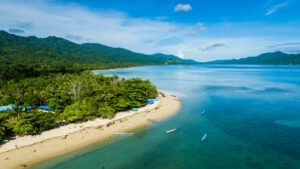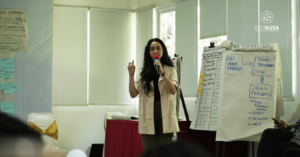
Tourist destinations in Tanah Papua are extremely friendly to be visited. Although there are inadequate infrastructure accessibility constraints, in fact the attractions and amenities presented by each tourist destination in Tanah Papua are keeping attract tourists’ attention, both domestic and foreign tourists. When visiting the Land of Papua, every tourist is required to have responsibility to preserve the environment and the sustainability of local tourism areas such as obeying customary regulations.
This became the main topic of discussion in the online meeting held by EcoNusa Foundation and Women’s Blogger entitled “Wonderful Papua” on Friday (7/8/2020). During the discussion, the speakers agreed that Papua Land is an attractive place for tourists to visit because of its natural and cultural wealth.
“Tourism in Papua can be enjoyed by all people from all over Indonesia and from any country in the world. However, people who visit must be able to maintain the destination so that it can be enjoyed continuously and can provide benefits for the local community,” said CEO of EcoNusa Foundation, Bustar Maitar who was one of the speakers at the event.
Tourism development in Tanah Papua is indeed quite promising for the long term. As a natural resource-based tourism destination, Tanah Papua is enriched with biodiversity that has been recognized by the world. Over the area that is well-known as the Earth of Paradise lies 125 types of mammals (55 percent endemic), 223 reptiles (35 percent endemic), 602 bird species (52 percent endemic), and 15,000-20,000 plant species.
If tourists still want to enjoy other types of tourism, cultural diversity in the Land of Papua is also a special attraction which can attract tourists much. There are about 255 indigenous tribes living side by side there. They speak with 384 different languages on a daily basis.
“Sometimes just separated by mountains, the language used is different,” said Bustar.
According to Bustar, tourism management in Papua must be based on the principle of ecotourism. In the Regulation of the Minister of Home Affairs Number 33 of 2009 concerning Guidelines for the Development of Ecotourism in the Regions, ecotourism is interpreted as a natural tourism activity in a responsible area by focusing on education, understanding, and support for natural resource conservation efforts, as well as increasing local community income.
“Why should Papua be encouraged to become an ecotourism or a green destination? Because our forests in Kalimantan and Sumatra are gone. Forests in Sulawesi are slowly running out. Forests in Papua have started to be cut down as well, if we don’t guard it, it will certainly run out and Indonesia will no longer have forests,” said Bustar again.
One of the ecotourism practices in Tanah Papua is demonstrated by homestay owners in Raja Ampat, West Papua Province. They build homestays with environmentally friendly materials. Good management of tourism facilities that prioritize environmental conservation is expected to help the maintenance of marine and forest resources sustainability in Raja Ampat.
“We build a homestay that does not damage the existing environment. We try as best as we can to protect and care for the environment. Several species are endemic in Raja Ampat, such as the red cenderawasih and bald cenderawasih,” said Kristian Sauyai, Chairman of the Raja Ampat Homestay Association.
Continuing Kristian’s statement, Alfa Ahoren, one of the young people of Papua from Manokwari, West Papua Province, encourages all young people to protect and preserve nature in Papua. According to Alfa, if the forest has changed its function, she is worried that biodiversity and culture will only remain as a memory.
“If nature is lost, our identity will also disappear. The place where we tell stories about many lives and our culture will also disappear. As young people, we must have a sense of love for the place where we are standing now,” Alfa emphasized.
Editor: V. Arnila Wulandani & Nina Nuraisyiah








